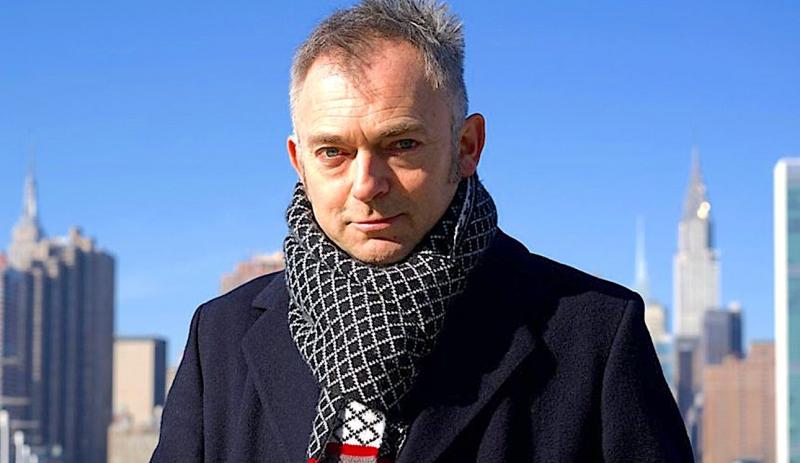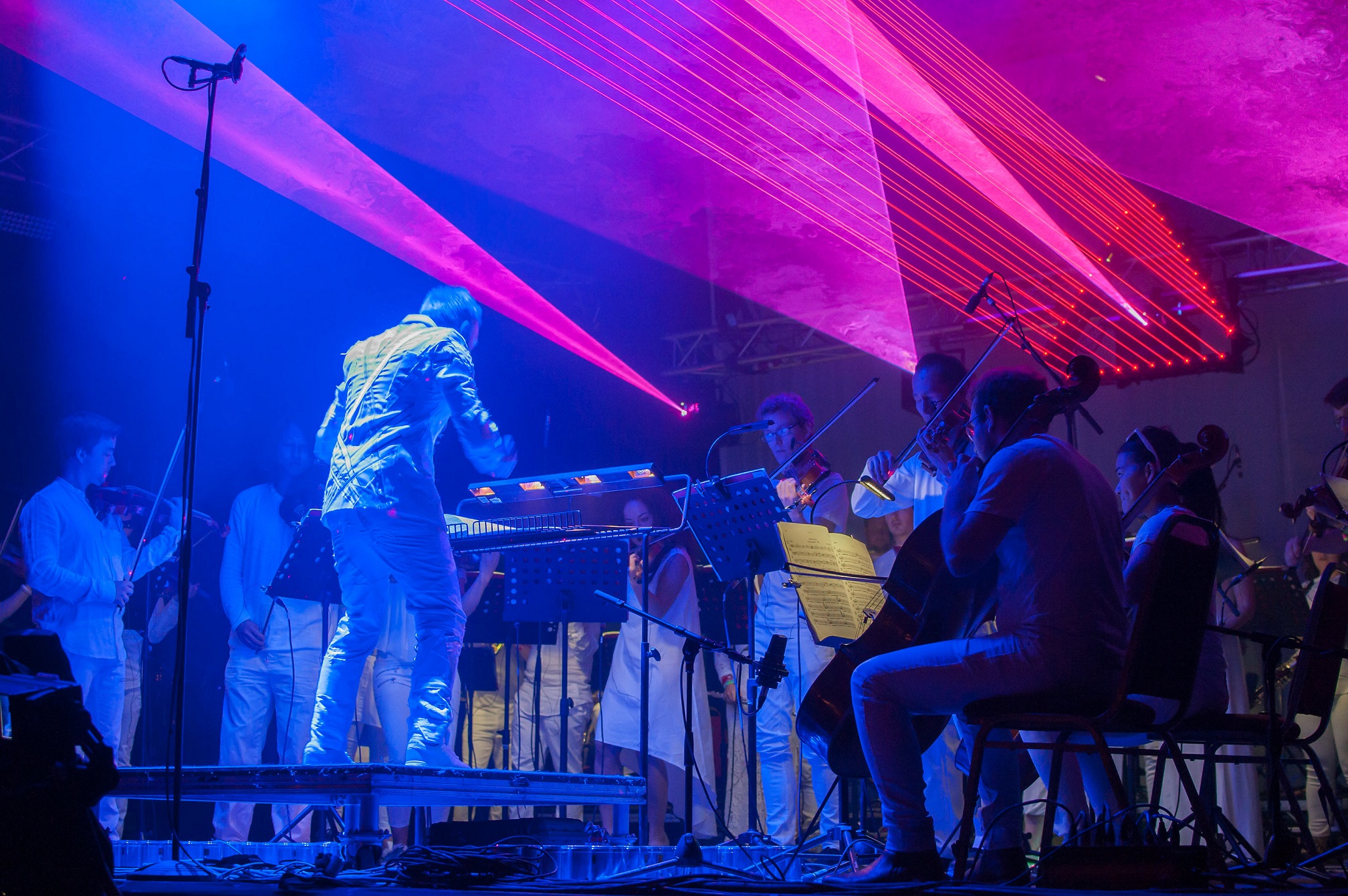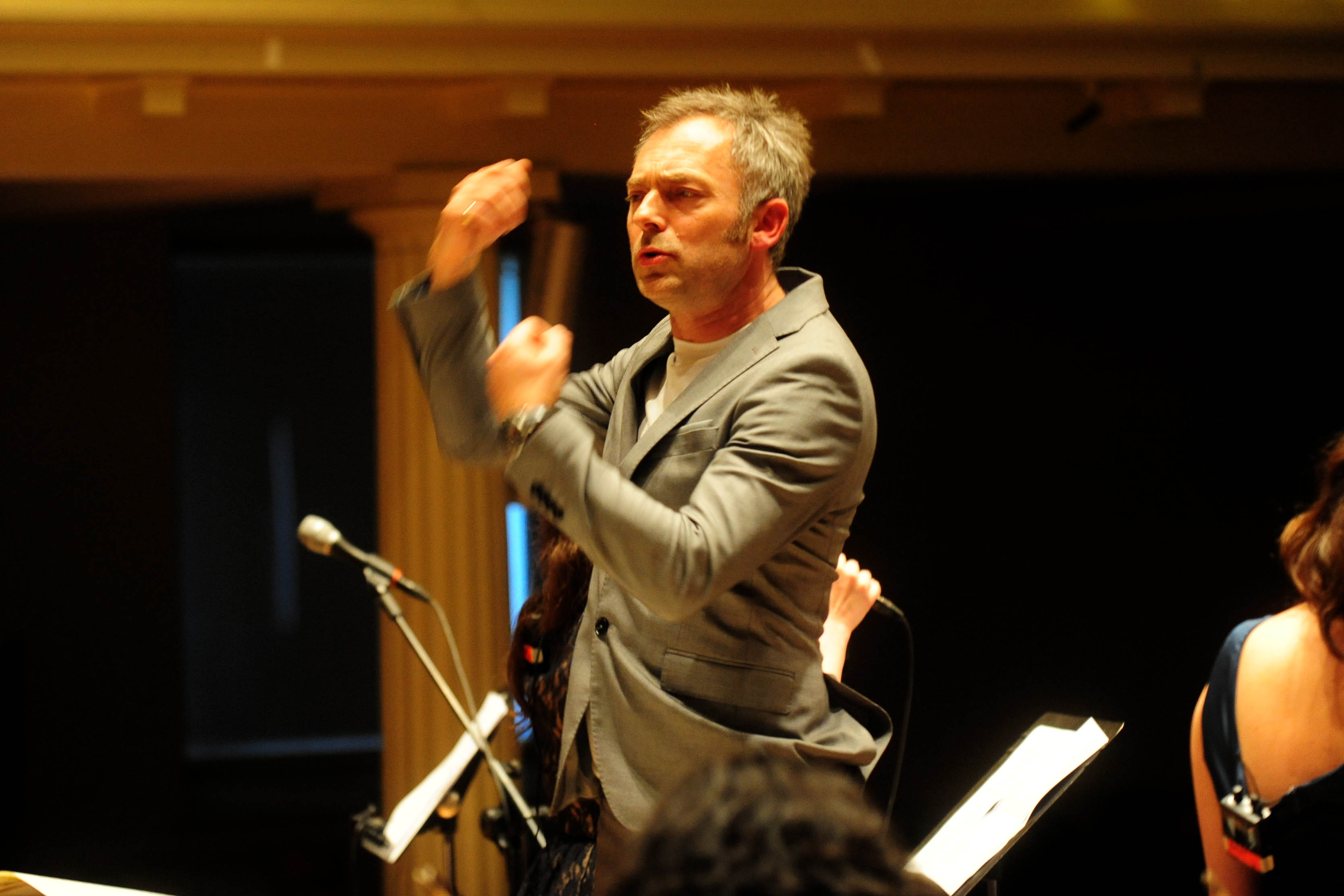10 Questions for conductor Charles Hazlewood | reviews, news & interviews
10 Questions for conductor Charles Hazlewood
10 Questions for conductor Charles Hazlewood
The man with the baton talks books, Brexit, minimalism, techno and time machines

Charles Hazlewood (b. 1966) has worked across the gamut of orchestral music, his career showcasing the multitude of ways it can be perceived and enjoyed.
In 1995 Hazelwood won the European Broadcasting Union’s conducting competition and has since performed with orchestras including the Swedish Radio Symphony, the Copenhagen Philharmonic and the London Philharmonia. He has worked with musicians ranging from Goldie and Wyclf Jean to Steve Reich and Nigel Kennedy and regularly presents works at the Glastonbury Festival. In 2012, he formed the British Paraorchestra, the world’s first orchestra of musicians with disability, to play at the closing ceremony of the London Paralympics. Hazlewood is also a composer and recent successes include his reinvention of The Beggars Opera as Dead Dog in a Suitcase and Other Love Songs, his 2017 opera The Tin Drum and his “karaoke musical” Ubu.
THOMAS H GREEN: Which was the first minimalist piece to truly suck you in?
CHARLES HAZLEWOOD: Terry Riley’s A Rainbow In Curved Air. At nine years old I had a music teacher at primary school, Mr Edmonds, and he’d play us this LP in its entirety, with Pink Floyd’s Dark Side Of The Moon also on his unorthodox syllabus. Terry’s piece stands as a sonic revolution, influencing musicians of all disciplines for the decades that have followed. It blew my mind; I couldn’t work out how he’d made such a sublime and complex piece of work just using the one chord. It’s entirely in A Major.
What is the greatest rock'n'roll gig you've ever seen?
 Without question, Neil Young at Glastonbury in 2009. That man! Oh, my God! It’s so rare that I really enjoy open air gigs, even though I love festivals as vital gatherings of collective witness, but he commanded that open space like nobody else. Sometimes it comes down to simply crafted and delivered music, with no need for digital wizardry, effects and coloured lights, just bass, drums, guitar, voice and a collection of unreal songs. Neil Young is a musician’s musician and rightfully, deeply respected.
Without question, Neil Young at Glastonbury in 2009. That man! Oh, my God! It’s so rare that I really enjoy open air gigs, even though I love festivals as vital gatherings of collective witness, but he commanded that open space like nobody else. Sometimes it comes down to simply crafted and delivered music, with no need for digital wizardry, effects and coloured lights, just bass, drums, guitar, voice and a collection of unreal songs. Neil Young is a musician’s musician and rightfully, deeply respected.
Which of your interviewees for Tones, Drones and Arpeggios did you find the most intimidating?
That’s an easy one to answer. It was La Monte Young; as much as I love him it was intense and difficult. We went up to his “dream house” and he’s like a minor deity with these disciples. A piece of thundering drone music by one of them was playing at ear-bleeding volume where we were being kept waiting, while this strong incense burned. After six hours, we had started losing the will to live, but then he appeared. We became quite ill for 24 hours after that, each of us suffering some kind of toxic shock. It’s all part of his uncompromising vigour, which I still greatly admire.
What book are you reading?
In the Realm of Hungry Ghosts: Close Encounters with Addiction by Dr. Gabor Maté. It’s about why people fall into the trope of addiction, whatever that might be, whether it’s drugs, alcohol, food, gambling or anything else. It’s about the whole hinterland, which people fall into with it. Reading it is helping to understand humanity, asking the questions as to why even a serial killer gets addicted to what they’re doing, where society treats addicts of any kind as "bad" or "lazy", casting judgement and applying penalties. As if that will ever heal someone that’s broken. The effect is easy to see, but the cause is harder to determine.
What was the last album you listened to end to end?
I enjoyed a summer re-familiarisation with Richard Strauss. He is very important to me personally as it was with one of his pieces that I conducted for the European Broadcasting Union Conducting Competition and won first prize. I was in my early 20s and it kick-started my career. On holiday in August I started listening obsessively to his music, in particular a recording by my friend Richard Stamp with vocalist, Gundula Janowitz, singing some of his orchestral songs. I got completely sucked in.
What can we expect from your minimalist nights at the Southbank Centre and Bridgewater Hall?
 Music is so often put in a silo all of its own, when it’s really a mirror of all humankind. You can’t divorce it from the rest of society, culture and history. It’s like Beethoven’s work was a reflection of the revolutionary times he lived in. Minimalism blossomed during the Cold War, the Cuban Missile Crisis, an era of sexual liberation and Vietnam and we can’t separate the music from the times. So, our performances are not only opportunities to hear often rarely performed, standout moments of minimalist composition, but with the guidance of writer, Jason Hazeley and filmmaker, John Minton, there will be visual context in the form of specially commissioned moving image.
Music is so often put in a silo all of its own, when it’s really a mirror of all humankind. You can’t divorce it from the rest of society, culture and history. It’s like Beethoven’s work was a reflection of the revolutionary times he lived in. Minimalism blossomed during the Cold War, the Cuban Missile Crisis, an era of sexual liberation and Vietnam and we can’t separate the music from the times. So, our performances are not only opportunities to hear often rarely performed, standout moments of minimalist composition, but with the guidance of writer, Jason Hazeley and filmmaker, John Minton, there will be visual context in the form of specially commissioned moving image.
How has your relationship with Glastonbury festival developed?
When we left London behind, we came to the South West. My heart is really in Cornwall, but it’s a bit too far away for now, so we stopped in Somerset. Pretty soon after we got here I bumped into Michael Eavis, who seemed pretty pleased that I was present in the area and we started talking about what we could do together. I’ve done loads there since, like conducting the National Youth Orchestra on the Pyramid Stage, working with The Unthanks, performing a repertoire of Thunderbirds themes and this year’s Barry White celebration. One great thing we did was to work with Henry Purcell’s bass lines, which cycle round and round very much like dance music, and used them as the heart of an improvised set. It turned into a rave, but with 17th century bass lines!
What's getting your goat right now?
My deep and bitter regret about the Brexit disaster is that it has revealed dark divisions and anger. Even in the rural areas in which I live there’s real, palpable anger and the media has amplified it with a climate of constant, unrelenting mudslinging. The dominant reason for the discord seems to be public figures completely sidestepping accountability. People are allowed to be inconsistent, it’s human, and people are able to change their minds, but the ability to completely deny bad decisions, misleading people or abuses of power without reproach is now the norm.
Britain had led the world because it was home to a mongrel race; our entire culture is a result of the contributions everyone has made. There are 300 languages spoken in London, incomparable to anywhere else on the planet, it’s the multicultural capital of the world. Somehow, our little island became the place where people chose to stop. Now people want to close the doors with the cruel development of a "hostile environment" based on false nostalgia.
How deeply is techno related to the "modern classical" tradition of minimalism?
Electronic dance music couldn’t have happened without minimalism. Listen to everything from 70’s electronic music to jungle to techno and dubstep beyond; it’s all founded on principles of repetition, slow change, drone, looping bass lines and sparseness giving way to intense busyness. So much of it is, simply, minimalism.
If you had a time machine and you could go back anywhere for 24 hours, where would you go and why?
I would go back to around 1770 to spend time with Mozart. All roads lead from him, not only was he perhaps the most talented human being to have lived, he was also a compassionate and humane angel. The film, Amadeus, gave an awkward representation of him as this child-man, but if you read his letters you find a deeply empathetic and kind soul, who was dealing with no shortage of worry. He experienced the deaths of children, a lack of patronage for his work and the financial problems associated with that. He had a difficult relationship with his father too. But he somehow transcended all that. Music poured out of him, looking at his notations there’s not a mark out of place, every one was made with absolute, unwavering clarity of vision and steadfast surety. Mozart just wasn’t like the rest of us.
- The Paraorchestra performs Minimalism Changed My Life: Tones Drones and Arpeggios at Southbank Centre on Saturday 28 September 2019 and Bridgewater Hall, Manchester on Wednesday 2 October 2019
Share this article
The future of Arts Journalism
You can stop theartsdesk.com closing!
We urgently need financing to survive. Our fundraising drive has thus far raised £49,000 but we need to reach £100,000 or we will be forced to close. Please contribute here: https://gofund.me/c3f6033d
And if you can forward this information to anyone who might assist, we’d be grateful.

Subscribe to theartsdesk.com
Thank you for continuing to read our work on theartsdesk.com. For unlimited access to every article in its entirety, including our archive of more than 15,000 pieces, we're asking for £5 per month or £40 per year. We feel it's a very good deal, and hope you do too.
To take a subscription now simply click here.
And if you're looking for that extra gift for a friend or family member, why not treat them to a theartsdesk.com gift subscription?
more New music
 Music Reissues Weekly: Joe Meek - A Curious Mind
How the maverick Sixties producer’s preoccupations influenced his creations
Music Reissues Weekly: Joe Meek - A Curious Mind
How the maverick Sixties producer’s preoccupations influenced his creations
 Pop Will Eat Itself, O2 Institute, Birmingham review - Poppies are back on patrol
PWEI hit home turf and blow the place up
Pop Will Eat Itself, O2 Institute, Birmingham review - Poppies are back on patrol
PWEI hit home turf and blow the place up
 'Fevereaten' sees gothic punk-metallers Witch Fever revel in atmospheric paganist raging
Second album from heavy-riffing quartet expands sonically on their debut
'Fevereaten' sees gothic punk-metallers Witch Fever revel in atmospheric paganist raging
Second album from heavy-riffing quartet expands sonically on their debut
 theartsdesk Q&A: Soft Cell
Upon the untimely passing of Dave Ball we revisit our September 2018 Soft Cell interview
theartsdesk Q&A: Soft Cell
Upon the untimely passing of Dave Ball we revisit our September 2018 Soft Cell interview
 Demi Lovato's ninth album, 'It's Not That Deep', goes for a frolic on the dancefloor
US pop icon's latest is full of unpretentious pop-club bangers
Demi Lovato's ninth album, 'It's Not That Deep', goes for a frolic on the dancefloor
US pop icon's latest is full of unpretentious pop-club bangers
 Yazmin Lacey confirms her place in a vital soul movement with 'Teal Dreams'
Intimacy and rich poetry on UK soul star's second LP
Yazmin Lacey confirms her place in a vital soul movement with 'Teal Dreams'
Intimacy and rich poetry on UK soul star's second LP
 Solar Eyes, Hare & Hounds, Birmingham review - local lads lay down some new tunes for a home crowd
Psychedelic indie dance music marinated in swirling dry ice
Solar Eyes, Hare & Hounds, Birmingham review - local lads lay down some new tunes for a home crowd
Psychedelic indie dance music marinated in swirling dry ice
 The Lemonheads' 'Love Chant' is a fine return to form
Evan Dando finally gets back in the saddle with an album of new tunes
The Lemonheads' 'Love Chant' is a fine return to form
Evan Dando finally gets back in the saddle with an album of new tunes
 Music Reissues Weekly: Evie Sands - I Can’t Let Go
Diligent, treasure-packed tribute to one of Sixties’ America’s great vocal stylists
Music Reissues Weekly: Evie Sands - I Can’t Let Go
Diligent, treasure-packed tribute to one of Sixties’ America’s great vocal stylists
 'Deadbeat': Tame Impala's downbeat rave-inspired latest
Fifth album from Australian project grooves but falls flat
'Deadbeat': Tame Impala's downbeat rave-inspired latest
Fifth album from Australian project grooves but falls flat
 Heartbreak and soaring beauty on Chrissie Hynde & Pals' Duets Special
The great Pretender at her most romantic and on the form of her life
Heartbreak and soaring beauty on Chrissie Hynde & Pals' Duets Special
The great Pretender at her most romantic and on the form of her life
 The Last Dinner Party's 'From the Pyre' is as enjoyable as it is over-the-top
Musically sophisticated five-piece ramp up the excesses but remain contagiously pop
The Last Dinner Party's 'From the Pyre' is as enjoyable as it is over-the-top
Musically sophisticated five-piece ramp up the excesses but remain contagiously pop

Add comment